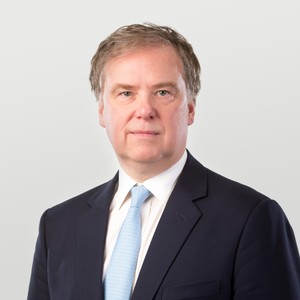LIVES
Barbican, London
FAMILY
A son & daughter at University
STARTED AT JM FINN
1991
FAVOURITE BOOK
The Wind-Up Bird Chronicle, Haruki Murakami
HERO
Queen Elizabeth II
PASSION
Driving fast cars, quickly. Drinking good wine, slowly. Not at the same time.
MOST PROUD ACHIEVEMENT
Maintaining my integrity
FAVOURITE FILM
Volver, Pedro Almodovar
FAVOURITE ARTIST
Paul Cezanne
FAVOURITE LOCKDOWN MOMENT
Connecting my first client zoom call to be rebuked for not wearing a tie!
FAVOURITE RESTAURANT
C’as patro march, Deia, Mallorca
IF I WASN’T AN INVESTMENT MANAGER, I’D BE...
An Investment manager. No regrets.
MOST CHERISHED POSSESSION
A bottle of Chateau Petrus 1964
MOST MEMORABLE MOMENT
Drinking the second bottle of the above
PET HATE
The nanny state
Congratulations on your 30 year anniversary at JM Finn. Looking back over your career, what do you consider the most memorable moments?
Being invited into partnership in 1995 was memorable, particularly as it coincided with the rare event of a partner resigning and I was put in front of a barrister who explained very bluntly the potential risks. I never doubted the opportunity or my fellow partners.
More profoundly perhaps, for most of us in the City at the time, the 11th September 2001 will be indelibly etched in my memory as one which put our business-focussed lives into perspective. I was celebrating the birth of my first child at the time with colleagues in The Pavilion in Finsbury Circus and will never forget the disbelief in the room as the horror unfolded and we quickly returned to our desks.
JM Finn is still very much the firm I joined over 30 years ago.
The firm has changed markedly during your career, not least its ownership structure. Which areas have you considered the most instrumental to you and your clients?
Yes we incorporated in 2006 and ownership passed to Delen in 2011 but great care and sensitivity has allowed some of the positive elements of the partnership ethos to thrive. The ongoing commitment to the dual-role of investment manager and client relationship manager is fundamental for my clients and for me. We have avoided the model portfolio, one-size fits-all route and maintained high levels of service to existing clients whilst also growing the business. JM Finn is still very much the firm I joined over 30 years ago and the scope for me to look after my clients remains uncompromised.
In 30 years you’ve witnessed some difficult periods for global stock markets. How has your approach to investing changed over the years, when it comes to guiding your clients through these periods?
Not much, I try to stay focussed on long-term fundamentals rather than short-term trends. Experience has also underlined the importance of managing expectations from the outset; that markets are cyclical and we generally stay invested particularly as down cycles tend to be shorter than the up cycles. In the run-up to the market corrections in ’87 & ’00 it was at least possible to generate a reasonable return in defensive areas such as cash and fixed income but low rates since have left few hiding places. The big losses in dotcom stocks in 2000 and financial stocks in 2008 served to underline the importance of not getting drawn too heavily into the hot sectors and in that regard it does help to have been through a few testing periods.
I try to stay focussed on long-term fundamentals rather than short-term trends.
The last 6 months has been a particularly tricky time for investors; how does the current market volatility compare to previous episodes?
For 20 or so years, risk assets have performed in favourable interest rate conditions and now we have the challenge of assessing the impact of higher rates on the valuation and performance of these assets. We have long talked about the hangover from a party fuelled by the prolonged period of easy credit and the combination of pent up consumer demand with persistent supply chain disruption caused by COVID has called time on the fun. We have seen marked divergence in performance across sectors of the market purely on valuation grounds as we try to predict the extent of rate increases with growth stocks particularly hard hit against market levels which remain incongruously high. It is the first time for many investors and advisors that inflation is the main economic and market concern and the volatility reflects the scramble to position for it.
What do you see as your clients' primary challenges for their wealth and have these changed over the years?
There has been a fundamental change in the attention my clients give to passing down wealth in their life-times and finding the delicate balance between retaining enough for their own needs whilst supporting children or grandchildren in housing or schooling costs. This is a modern approach to family finances driven more by attitude than tax concerns. At the same time, the long-held belief that capital should remain untouched and only income spent has been challenged by the low interest rate environment.
Spending capital on the assumption that growth will replenish it has been a necessary but difficult step for many clients which can also raise pressure in weak market conditions. These changes make the initial and ongoing assessment of risk, timing and flexibility of investing more important than ever and require us to keep quite a lot of balls in the air at the same time. Thankfully, for me and clients alike, after over 30 years in what has become a very professional industry there is still room in that process for individuality and some joie de vivre.





